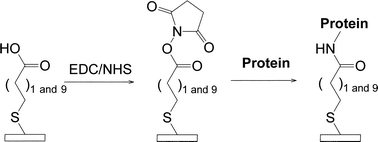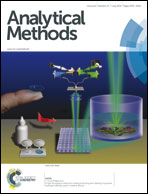Quartz crystal microbalance based biosensor for rapid and sensitive detection of maize chlorotic mottle virus
Abstract
In this work, we report a biosensor based on a quartz crystal microbalance (QCM) for the selective and sensitive detection of maize chlorotic mottle virus (MCMV). A mixture of 10 : 1 3-mercaptopropanoic acid and 11-mercaptoundecanoic acid was applied on gold surfaces of QCM crystals to form a self-assembled monolayer, and an anti-MCMV antibody was crosslinked on the surface for specific recognition of MCMV. The frequency change of the QCM crystal is a function of the concentration of MCMV with a response range from 250 ng mL−1 to 10 μg mL−1. The standard curve is R2 = 0.997, indicating a high reproducibility in MCMV detection. The detection limit is approximately 250 ng mL−1, which is similar to that of the existing enzyme-linked immunosorbent assay (ELISA) method. The QCM sensor showed highly specific and sensitive recognition for both purified MCMV and crude extracts from corn leaf samples.


 Please wait while we load your content...
Please wait while we load your content...